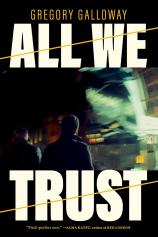Interview: July 10, 2025
ALL WE TRUST by Gregory Galloway is a twisty tale about two small-town crooks who get in over their heads. In this interview conducted by Michael Barson, Senior Publicity Executive at Melville House, Galloway talks about his writing process, the research he did for the book, the 20th-century crime novelists he feels have been overlooked the most and deserve to be rediscovered, and the most significant changes that have taken place in the publishing industry since his debut novel, AS SIMPLE AS SNOW, released 20 years ago.
Question: How did the writing process for ALL WE TRUST differ from the one you employed for your previous crime novel, JUST THIEVES, in 2021?
Gregory Galloway: My process is usually the same, which is to say that I never know what I'm doing. The novel unfolds through me figuring out the characters and how they relate to each other (this time literally, with half-brothers, daughters, ex-wives and other family members making up most of the cast). The biggest difference was finding the motivation to write at all. I started work on the novel in the immediate months after my dad died, and I wasn't sure I wanted to write about family strife, divorce, death and betrayal (everything that ended up being in the final version). So in some ways, ALL WE TRUST is more personal than other things I've written.
Q: Your first novel, AS SIMPLE AS SNOW, came out 20 years ago. What would you identify as the biggest changes that have taken place in publishing over those two decades? The best? The worst?
GG: It seems as if everything has changed and is maybe changing back again (e.g. B&N going away, now coming back), but it is certainly a smaller world through mergers and consolidation.
The best that has happened is that books are still being read and are still important to readers --- even though in the past 20 years everything was going to "kill" books: Amazon, the "death" of independent bookstores, the "death" of B&N, e-books, audiobooks, streaming and podcasts, a pandemic, now AI.
Probably the worst change (for us writers) has been the cluttered landscape. Between understaffed publishers, self-publishing and influencer-driven reviews, its challenging to get a book noticed and impossible to keep up with the constant flow of new titles. From a reader's perspective, though, this might be the best development.
Q: You are working in a grand tradition that dates back to the 1930s --- crime novels with literary merit that don’t attempt to sugarcoat the dark side of human nature. What was the noir novel you read that first set you on this writing path?
GG: I think I was in the sixth grade, bingeing on Agatha Christie and Sherlock Holmes, when a librarian handed me a bunch of paperbacks left over from a book sale. In that bunch was Dashiell Hammett's THE CONTINENTAL OP (a collection of short stories) and THE GLASS KEY. After that, I read everything "hardboiled" and "noir" I could get my hands on.
Q: In the course of writing ALL WE TRUST, did you avoid reading other authors’ crime novels altogether? Or are you able to indulge without fear of that skewing any of your own writing in the coming days?
GG: I usually need to avoid most fiction when I'm working on something, and limit myself to nonfiction and poetry, but I do refer to things. For ALL WE TRUST, I looked back at some novels by Jean-Patrick Manchette, and especially the work of Ted Lewis and Derek Raymond. Manchette for his subversion/expansion of the crime novel --- and his take on the economics of it --- and Lewis and Raymond for how they handle information and violence. I was woefully ignorant of most British crime writers, so Lewis and Raymond were particularly engaging for me.
Q: Can you name three noir fiction authors whose work in the 21st century has seemed particularly important in terms of keeping the genre alive and well?
GG: I could probably name 30, but certainly Megan Abbott, S. A. Cosby and Scott Phillips have done tremendous work.
Q: Who is the 20th-century crime novelist who you feel is the most overdue for rediscovery by today’s readers? And why would you surmise they have been overlooked all these years?
GG: Definitely Dolores Hitchens. She wrote FOOL’S GOLD, which Jean-Luc Godard turned into the film Bande à part, as well as novels with her railroad detective husband, and used a number of pseudonyms. Margaret Millar is another. Both Hitchens and Millar are included in Library of America's WOMEN CRIME WRITERS: Four Suspense Novels of the 1950s. Both have been overshadowed by male writers --- Millar by her own husband, Kenneth Millar, who published as Ross Macdonald --- and I think by the fact that they wrote diverse and varied crime novels. Both had multiple detectives who appeared in multiple series, but they predominantly wrote stand-alone novels.



